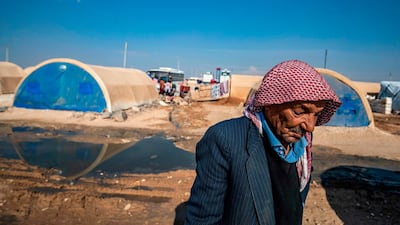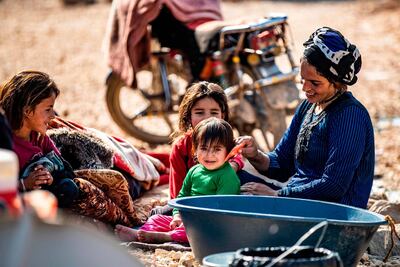A senior US official slammed on Thursday the two-day summit hosted by the Assad government in Damascus on refugees, calling it a “public relations stunt”.
“No substance, just a dog and pony show,” the US special representative on Syria, Joel Rayburn, said on Thursday.
Mr Rayburn said the meeting was a way to distract from the fact that the government of Syrian President Bashar Al Assad was continuing to attack civilians.
“There’s no pledge to end attacks against Syrian civilians, which is what is causing the refugee crisis in the first place,: he said.
"These countries joined the gathering in Damascus and falsely suggested that Syria is now safe for refugees to return.”
While Russia helped to host the meeting, the attendance was mostly regional countries and allies of Mr Al Assad.
Iran, Iraq, Lebanon, Venezuela and China attended, while the US, European countries and Canada did not.
The UN resident co-ordinator in Syria, Imran Riza, attended as an observer, not a participant.
Mr Al Assad addressed the conference by video and claimed that “pressure and intimidation” from host countries was keeping refugees from returning to Syria.
Mr Rayburn accused some of those attending of enabling Mr Al Assad’s brutality.
“Some of the countries that joined are the same ones that continue to kill and injure civilians in Syria and those same ones that have been forcing millions to flee the country,” he said.
The UN High Commissioner for Refugees said more than 5.6 million Syrians were forced to flee their country since the war broke out in 2011.
Just last week, children were killed during heavy shelling by the regime in Idlib province.
Mr Rayburn said the US policy objectives remained the same in Syria.
“We are committed to the enduring defeat of ISIS and Al Qaeda, irreversible political solution to the Syrian conflict in line with UN Security Council resolution 2254, and the removal of all Iranian-backed forces from Syria,” he said.
Mr Rayburn expected this policy to hold when president-elect Joe Biden was in charge next year.
“There's a bipartisan mandate for the Syria policy that we've been executing and that is unlikely to change,” he said.
The Trump administration is expected to increase sanctions on the Assad regime in the next two months.
“Until there's accountability and justice, there cannot be meaningful discussions around refugee returns,” Mr Rayburn said.
Richard Albright, US deputy assistant secretary of population, refugees and migration, said the regime had ulterior motives for wanting the refugees to return.
“Russia and Assad are using refugees as political pawns, believing that if they return to Syria they will lend legitimacy to the regime,” Mr Albright said on Thursday.
He dodged questions about the Trump administration's severe limits on admitting refugees.
“The United States is the leading country donor to the Syrian humanitarian crisis response [$1.7 billion] and we will continue to support this response, and so we have a sustainable solution to the crisis,” Mr Albright said.
Emma Beals, an independent researcher and editor at Syria in Context, said the Damascus conference lacked the basic structure and elements to enable the return of refugees.
"While the issue of refugee return in Syria is a very serious subject, this week's conference in Damascus was not," Ms Beals told The National.
"The conditions for safe and voluntary return don't yet exist anywhere in Syria."
She said there were no representatives of Syria’s displaced at the meeting, and that the focus was on “a political rhetoric and a version of refugee return that had no grounding in international humanitarian law or normal refugee returns policies.”
For the US and its partners, the focus should be on a political agreement and significant change in Syrian government behaviour, Ms Beals said.



